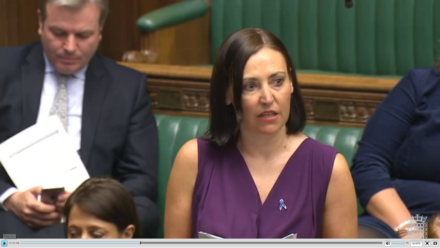
This brave speech by Labour’s Vicky Foxcroft was one of a series of passionate interventions by MPs from across the political spectrum when the Commons met yesterday to mark Baby Loss Awareness.
I want to start by paying tribute to the hon. Members for Eddisbury (Antoinette Sandbach) and for Colchester (Will Quince) for securing this debate. This is probably the hardest speech that I have ever had to write and deliver.
This week has been a tough week, as I had never heard of Baby Loss Awareness Week but it has been all around me. There have been online discussions and commemorative badges, and we have a debate in the Chamber today. I have struggled in a debate with myself about whether I should contribute today, as it is such a personal issue, and whether I want to share my very personal experiences. The absolute truth is that I struggle to talk to my family and very close friends about this, but during the events of this week, I can see that a large focus is on people talking about their loved ones, supporting each other and making sure that, when needed, important issues are raised and addressed.
I thank all my friends who have come into the Chamber today to support me as they know how hard this is for me. I also want to apologise to my many friends who I have not told about this. It is not because I do not want them to know or that I am embarrassed; it is just because I find it so very hard to do so. Ever since I was elected, I have always said that I want to be the kind of politician who is willing to share my experiences—not for therapy, but to empower others and to seek to change things for the better. Lewisham bereavement counselling service tells me that it has a two-to-four month waiting list, and that just is not good enough.
I guess that now is the time for me to talk about and pay tribute to my little angel, Veronica. When I was 16 years old, I became unexpectedly pregnant. At first, I was terrified and even debated having her adopted, but during my pregnancy something changed—I became so attached; I was excited; I was going to be the best mum ever. Me and my partner at the time named our baby girl Veronica. We could not wait to meet her. I went full term and was 10 days overdue, so they had to induce me. I was in labour for a long time. I was sick, tired and in a huge amount of pain.
Veronica’s heartbeat was checked regularly and everything was fine, but once I was dilated, the staff checked for her heartbeat again and could not find it. This went on for about 20 minutes, checking with different machines because the staff were not sure whether the equipment was broken. Eventually, the doctor was called and I was rushed to the emergency room. I had to push, and forceps was used to get her out. The umbilical cord had been wrapped around her throat for the whole 20 minutes. She lived for five days, but we had to agree to the life machine being turned off. I got to hold her then for the first time until her heartbeat eventually stopped. She stayed alive for hours. I never wanted to let her go.
My baby awareness week is every year from 22 to 27 February—my five days of her being alive. She was never able to cry or to smile, but I loved her and I desperately wanted her. I still love her. She is always in my thoughts—all these years afterwards—even if I do not talk about her all the time. I do not not talk about her because I am embarrassed—I am not. It is because it hurts so much to do so.
After Veronica was taken from me, my coping mechanism was to chuck myself into college and work. I could not talk about it; my heart was broken. I do not have children now because I have lived with the fear of the same thing happening again, and I just could not go through it twice. I have to say that, as a young woman going through this, I felt as if most people looked at me as if I should be grateful—I was not and I am not. It felt like every organisation I dealt with gave me that same message. Every time I wanted to campaign to highlight the problems that led to her life being taken away so unfairly, I was treated like a kid, not a grieving mum. I was her mum. I also hoped that, one day, I would be her best friend. If she was alive today, she would be 23 years old. The pain does get easier to deal with over time, but it never ever goes away.
I really welcome this debate and genuinely pay tribute to Members for bringing it forward. I hope that, one day, no one else has to endure this pain. I want my experience to be heard by young women in my constituency and across the country who have been through this, or who may go through it in the future, and to just say to them, “You’re not alone.”



More from LabourList
Lou Haigh to reveal ‘roadmap’ for public ownership of railways within first term
Rochdale Labour says brick thrown at candidate’s home with ‘f*** Labour’ note
‘Frank’s poverty mission lives on at his charity – but he’d scrap two-child cap’